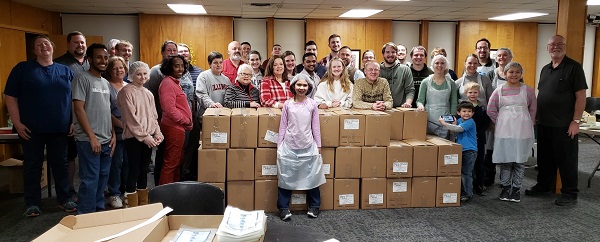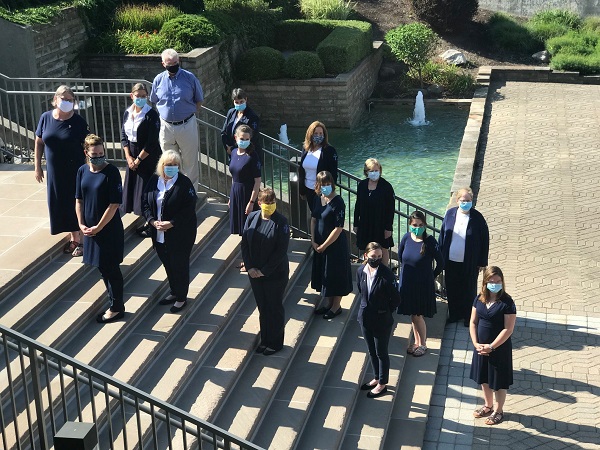
Deaconess Intensives Come to an End


Concordia Theological Seminary, Fort Wayne
κήρυξον τὸν λόγον. Preach the Word.

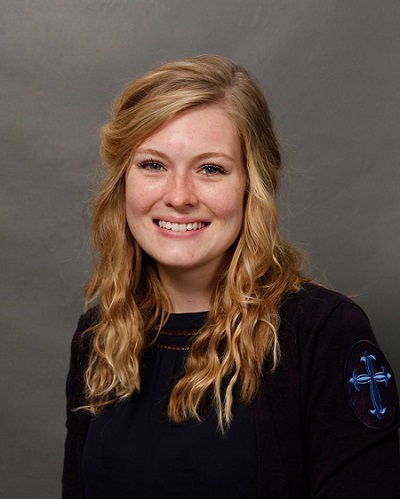 Last month, shortly after the COVID-19 shutdown, we received the following message from Rev. Derek Wolter, Chaplain at the Lutheran Home & Harwood Place in Milwaukee, Wisconsin. He wrote to boast of his deaconess intern, Anna Miels, who is in our Master of Arts (Leading to Deaconess Certification) Program. She began her internship at Lutheran Home & Harwood Place in January 2020.
Last month, shortly after the COVID-19 shutdown, we received the following message from Rev. Derek Wolter, Chaplain at the Lutheran Home & Harwood Place in Milwaukee, Wisconsin. He wrote to boast of his deaconess intern, Anna Miels, who is in our Master of Arts (Leading to Deaconess Certification) Program. She began her internship at Lutheran Home & Harwood Place in January 2020.
“Anna has been a true gift to us during this current situation,” Chaplain Wolter explained in an email to Deaconess Amy Rast, Associate Director of Deaconess Formation Programs here at CTSFW. “There is no way that the spiritual needs of our residents could ever hope to be met if we did not have her with us. This young woman truly embodies the vocation of service to the Lord’s people, and we are blessed that she is among us.”
He went on:
So what, exactly, does a deaconess do? Anna Miels, Deaconess Intern at Lutheran Home and Harwood Place in Milwaukee, Wisconsin, could provide a ready answer to that question, if she would take a minute from her work during the current COVID-19 situation. So I, her supervisor, will speak on her behalf.
A deaconess in a mercy-based ministry, such as a health care center, spends hours each day visiting our residents on a one-to-one basis. She often is the only visitor that a resident will have who is there simply to provide comfort and companionship. Families are currently restricted from all visits, and staff members are overwhelmed due to absence of fellow workers. The deaconess is that one-on-one assurance that person in his/her humanity is important, valued, and cherished, not only by our Lord but by fellow members of the Church of Christ.
The deaconess answers requests to be with a resident who is actively dying, whose family is not able to be present, whether because of virus restrictions or distance from each other. She prays with and for the resident, reads the words of Scripture and offers prayers for peace and comfort during the transition from this world to our Lord’s presence. She may be the last person to speak a work of hope, to hold a hand in comfort, to ease the loneliness that often accompanies death.
The deaconess answers the call to bring a word of comfort to someone suffering through depression and hopelessness. She is there when a person is isolated by a new routine when they arrive here, or when a resident loses a child or grandchild to death. She is with the individual in their loss and hurt, bearing the burden of pain and fear with them as she speaks of Christ, His love and presence, and the hope that He brings of restoration.
The deaconess provides for the needs of the staff by taking upon herself extra duties so that staff members can rest and find some refreshment for their spirit. She may serve meals in resident dining rooms, help with resident hygiene, or make deliveries of clean clothing and supplies from families who cannot go past the front desk. She calls the families of residents she has visited, giving them the assurance that their loved one is cared for, that the resident has an advocate in the facility even though family cannot be there. She goes above and beyond to meet the needs of God’s people as they develop in real time.
The deaconess expands her offering of Bible classes and devotions to comply with orders restricting the number of people who can gather. Her number of events may go from two to six in a week, and she is there with kindness and compassion as she delivers the Word of God and the hope of the Gospel to those in her care. She may be asked, at a moment’s notice, to develop a series of devotions to include in a weekly devotion booklet, so that people can have a spiritual resource that speaks to their current fears and situation. She may arrive early and stay late so that she can enter her care notes in residents’ individual records, having spent her regular eight hour schedule in direct personal care of the residents, her duties and events having expanded due to the current crisis.
In short, the deaconess is an extension of the chapel, the visible reminder of the presence and love of God in Christ. Her hands, her voice, her skills all seek to serve the Lord by bringing comfort, meaning, and peace to his people as they experience the cares and fears of a fallen world. She is the servant of her Lord, seeking only to bring comfort to His people. She is a great resource to the Church, and a blessing to any ministry to which she is attached.
We’ve had three Doctor of Ministry (DMin) defenses at CTSFW this past quarter. The DMin Program is designed for the working pastor, and their dissertations always reflect a topic or project that will serve their particular parish or synod in service to the Church. All three men gracious introduced themselves, spoke about their dissertation topics (all of which you can see are tied into who they are and where they serve), and what the DMin Program meant to them. In alphabetical order:
Rev. Peter Elliott; Associate Pastor, Saint John Lutheran Church, Fraser, MI
The Plan of Salvation: A Fifteen-Week Christological Survey of the Scriptures for Saint John Lutheran Fraser, Michigan
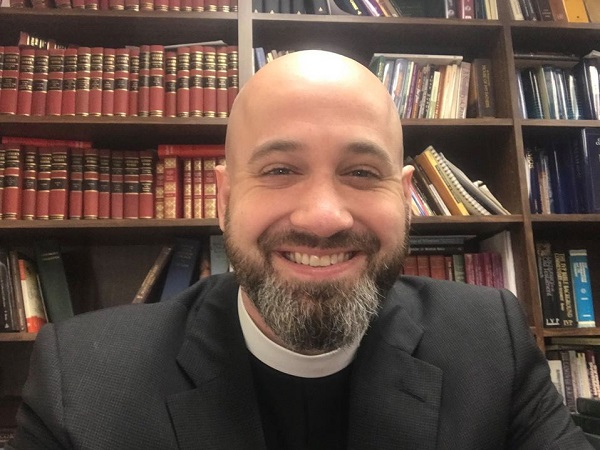
“I’m a lifelong Lutheran. I was born in Ft. Wayne as my father Mark was graduating CTSFW in 1984. From my earliest memory I’ve wanted to be a pastor. My older sister Christy Rivers is a teacher at Faith Lutheran in Plano, TX, where she attends with her husband Matt. My older brother Paul Elliott is ordained, serving as a professor at Concordia Irvine, and his wife Krista teaches at St. John Orange. My younger sister Sarah lives in Dallas, where her husband, Adam Douthwaite, serves as a pastor at Our Redeemer. We all live within the LCMS bubble. I am married to my wonderful wife, Valerie, and we have 7 children: Elijah, Daniel, Isaiah, Grace, Moses, Hannah, and one in the womb.
“Since fall 2017, I’ve served as the associate pastor of St. John Lutheran Church and School in Fraser, MI. Fraser is north/northeast of Detroit, and St. John is a traditional congregation known for its school and excellent music, led by organist Mel Machemer. The congregation is about two-thirds ages 45 and younger, and we have about 600 in attendance each weekend.
“Many of the newest members come from unchurched backgrounds, which is exciting, but it has also caused difficulties. Even after attending our catechetical new member class, biblical literacy is often lacking. Therefore, I was charged with creating and leading a 15-week overview of the Bible for new members. This became my DMin project. The class covered the general content of each book of the Bible, the centrality of Christ, and Law and Gospel. The overall goal was to increase the participants desire to attend future congregational Bible studies.
“The feedback from the class—as reported through surveys and focus groups—was overwhelmingly positive. The participants were surprised by the connections between various books of the Bible and between the two testaments. The participants especially found joy in seeing Christ in the Old Testament. Bible study habits have improved, and new members have craved pastoral instruction, even during this pandemic. Through teaching the 15-week course, I became interested in the topic of typology, and so the dissertation includes an excursus on Christ types of the Old Testament.
“I would highly recommend the DMin program at CTSFW, and I’ll miss intensive courses because of the fellowship and the time I was given to attend chapel. The seminary has refreshed me for ministry in Christ’s Church.”
Rev. Jeffrey Goodman; Pastor, Salem Evangelical Lutheran Church, ELCA, Ephrata, PA
The Mid-Week Divine Service: Its Theology, History, Usage and Implementation in a Lutheran Parish Church
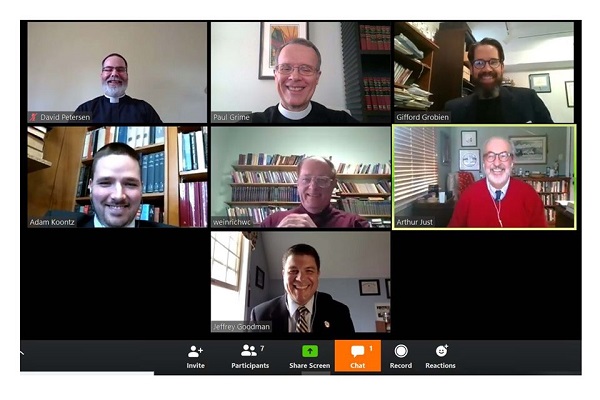
“I came into The Lutheran Church through attending a Wednesday Divine Service. To be able to receive our Lord’s Word and Sacrament in the middle of the week was a great comfort to me. So when I received a call to serve a small, struggling Lutheran parish in Lancaster County, PA, I was charged early on with developing a second service. The common assumption was that we would add another service to our Sunday, but I remembered how I came into the Lutheran Church through a Divine Service during the week and how others may as well.
“We initially began with a vigil service on Saturdays, but this service after a year never gained traction. At the suggestion of an experienced local pastor we moved the service to Thursday evenings. Over time we were able to build a chapel for the Thursday service and eventually expand our liturgical offerings to other days of the week as well. Moreover, our liturgical calendar expanded when we started placing commemorations on the church’s calendar instead of moving them to Sundays. The second half of the paper chronicles this history.
“The first part of the paper explores the biblical evidence for having services outside of the Sunday assembly. It also looks at how the mid-divine service was used in the early church and up to the Reformation. From that I explored how the mid-week Divine Service has been used in my own tradition here in Pennsylvania through examinations of Heinrich Muhlenberg, and his heirs in the General Council of which the parish I serve was once a part. I do consider the Sabbatarian arguments made by SS. Schmucker and his Gettysburg/General Synod colleagues. Finally, three churches from the same “Muhlenberg tradition” were examined to see how they have used the mid-week divine service in their lives together.
“Because of the mid-week Divine Service, the small parish I serve has seen growth not only in numbers, but in its life together. We went from being a church that only gathered on Sunday to being a church that gathers multiple times during the week. I believe this is essential to forming a resilient, long lasting Lutheran parish church. It has also made me a better preacher simply by requiring me to prepare for more than one sermon a week. I find myself preaching two, three, and even four times a week. This makes for a more effective preacher of the Word in my mind.
“The DMin Program at CTSFW has been wonderful. I am leaving the program a much more confident and informed pastor. I have come to understand to a deeper degree what it means to be called by a parish. In my mind there is no better place for a Lutheran pastor to study then CTSFW. I am not LCMS and I was welcomed by my fellow students and teachers, but I was also challenged by them to think through my own tradition, the nature of a call, and what it means to be a faithful Lutheran pastor.”
Rev. Wade Mobley; President, Free Lutheran Bible College and Seminary)
Sharper: A Proposal for Continuing Education within the Association of Free Lutheran Congregations
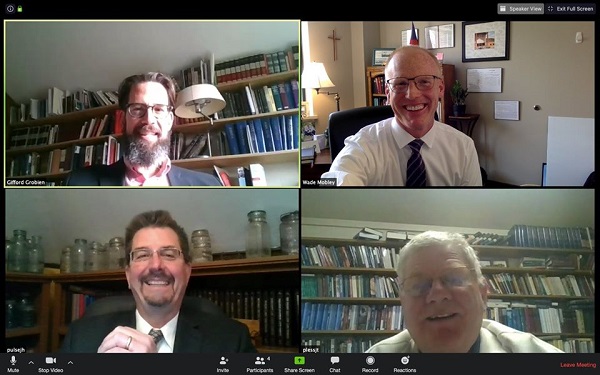
“The Association of Free Lutheran Congregations has no specific scope or delivery method for continuing education for her pastors. I serve as the President of our Bible College and Seminary, so I am in a position to advocate and provide for this continuing education. My project focused on finding out what/how our men are educating themselves, what their needs are for continued sharpening, and how we can best augment our MDiv program.
“The outcome of the project was a theologically-focused aim for continuing education that uses existing and yet-to-be developed means for formal and informal continuing education. The irony, though, is that the week I submitted my dissertation the whole world shut down, our summer opportunities are much in doubt, and planning for next fall seems presumptuous to our constituency. That said, this too shall pass, and I will put our plan into practice 6-12 months later than stated.
“I am thankful for the DMin program at CTSFW. I started the program shortly after accepting the call to leave my congregational ministry of twelve years to serve as President of the Free Lutheran Bible College and Seminary (the Bible College and Seminary of the Association of Free Lutheran Congregations, AFLC). The program was academically rigorous, but also logistically accessible. The courses were well designed and the instructors highly qualified. Dr. Gifford Grobien and Mrs. Cynthia Johnson administered the program with efficiency and friendliness. Though I serve outside of the LCMS, I enjoyed the fellowship of Christian brothers in class, on campus, and online. My capacity for ministry quality and quantity increased in my time of study, and I will forever be thankful for the quality education offered by CTSFW for the benefit of our institution and the AFLC.”
You can learn more about the DMin Program at www.ctsfw.edu/DMin, or by contacting the CTSFW Office of Graduate Studies at graduatestudies@ctsfw.edu or (260) 452-2203.
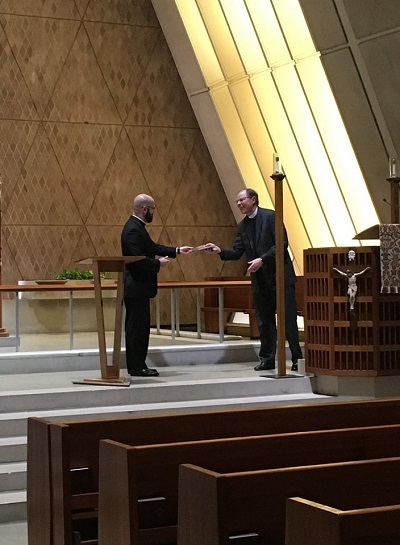 Today after chapel, Dr. Charles Gieschen, Academic Dean, presented the annual academic awards at CTSFW. You can still watch the presentation at the end of today’s daily chapel service either here on Facebook or at www.ctsfw.edu/dailychapel. Fourth-year seminarian and Student Association President Jonah Domenichelli served as master of ceremonies. At the end of the service, fourth-year seminarian Mark Kranz presented the 2020 Class Gift: “Apostolic Agenda: The Epistles of the Holy Apostle Paul to Titus and Philemon.” The translation of this work by Friedrich Balduin was commissioned and funded by this year’s fourth years. You can find a copy at https://emmanuelpress.us/2020/05/05/coming-soon-apostolic-agenda-the-epistles-of-the-holy-apostle-paul-to-titus-and-philemon.
Today after chapel, Dr. Charles Gieschen, Academic Dean, presented the annual academic awards at CTSFW. You can still watch the presentation at the end of today’s daily chapel service either here on Facebook or at www.ctsfw.edu/dailychapel. Fourth-year seminarian and Student Association President Jonah Domenichelli served as master of ceremonies. At the end of the service, fourth-year seminarian Mark Kranz presented the 2020 Class Gift: “Apostolic Agenda: The Epistles of the Holy Apostle Paul to Titus and Philemon.” The translation of this work by Friedrich Balduin was commissioned and funded by this year’s fourth years. You can find a copy at https://emmanuelpress.us/2020/05/05/coming-soon-apostolic-agenda-the-epistles-of-the-holy-apostle-paul-to-titus-and-philemon.
ACADEMIC AWARDS
The St. Timothy Award: Silas Hasselbrook
The Zondervan Greek Award: Gino Marchetti II
The Zondervan Hebrew Award: Zachary Oedewaldt
The Exegetical Theology Writing Award: Blake Martzowska
The Classical Association of the Middle West and South Award for Outstanding Accomplishment: Alexander Blanken
The Draves Family Scholarship: Joshua Schiff
The Zondervan Theology Award: Christian Schultz
The Systematic Theology Writing Award: Gino Marchetti II
The Gerhard Aho Homiletics Award: Kyle Nelson
The Pastoral Ministry and Missions Writing Award: Daniel Gray
The Historical Theology Writing Award: Jonathan Olson
OTHER AWARDS
The Elizabeth Fedde Award for Outstanding Service (presented by Dr. James Bushur): Anna Barger and Kimberly Wolkenhauer
The Shepherd’s Staff Award (presented by Seminarian Jonah Domenichelli): Brett Witmer
Here are the Call candidates for this year, starting with the top row, going left to right:
1st row: Jakob and Rachel Andrzejewski; Christopher and Karin Antonetti; Tyler Arends; Albert and Gretyl Bader; Patrick and Whitney Baldwin
2nd row: Norlyn and Elaine Bartens; Daniel and Teresa Broaddus; Lyle (wife Christine isn’t pictured) Buettner; Jon and Shannon Carpenter; Jared and Anna Cooksey
3rd row: Simeon and Emily Cornwell; Jonah and Renee Domenichelli; Keith and Farrah Emshoff; Robert Etheridge; Daniel Fickenscher and Taylor Brown-Fickenscher
4th row: Scott and Zara Hedtke; Jeffrey and Haley Kazmierski; David and Mikayla Keating; Andrew and Maggie Keller; Mark and Bethany Kranz
5th row: Kurt Laskowsy; Timothy and Mary Magill; Gino Marchetti II; Mark and Debra Matheny
6th row: Joseph McCalley; Sawyer and Rebecca Meyers; Zachary and Amber Oedewaldt; Jonathan and Marie Olson; Joshua and Megan Reber; Brock Schmeling
7th row: Daniel and Christine Schuetz; Timothy and Kaitlin Sheridan; Grant and Kimberly Sorenson; Titus and Rianne Utecht; Thomas and Elizabeth Van Hemert
8th row: Jay Weideman; Nathan Wille; Isaac and Bethany Wirtz; Brett Witmer; Justin and Victoria Woodside
This year’s vicars-elect, starting with the top row and listing everyone left to right:
1st Row: Emmett and Jaimie Bartens; John and Katherine Baseley; Adam and Meg Baumann; Timothy and April Benzinger; Joshua and Ashley Brandmahl
2nd Row: Dane Breitung; Matthew and Moriah Christian; Brennick and Bethany Christiansen; Raymond Cox; Mark De Young
3rd Row: John Dolde and fiancee Emma Wendorff; Joshua and Michaela Dub; Matthew Goehring; Daniel and Michelle Gray; Brendan Harris
4th Row: Silas and Moira Hasselbrook; Nathaniel and Hannah Konkel; Chase Lefort; Anthony Mandile IV; Benjamin McCrimmon
5th Row: Austin and Elizabeth Meier; Kyle and Nicola Mullins; Kyle and Stephanie Nelson; Charles Nemec and fiancee Christianna Eckstein; Jordan Peiser
6th Row: Aaron and Katherine Schultz; Vincent Shemwell (pictured with his grandmother); Eric and Rebecca Souer; Timothy Steele II with his wife Amy; Ethan Stoppenhagen
7th Row: Stuart and Cathleen Sultze; Christopher and Dana Walters; Aaron and Leah Wendorff; Nathan and Amy Widener; Jason and Michelle Zoske
This year’s Deaconess Interns: (top row, left to right) Katherine Aiello with husband Gabriel; Anna Barger with husband Caleb; Amanda Korthase; and
Emilyann Pool with fiance Jake Wert (bottom row, left).
And Deaconess Placement Candidates on the bottom row: Taylor Brown-Fickenscher with husband Daniel (middle) and Mika Patron (right).
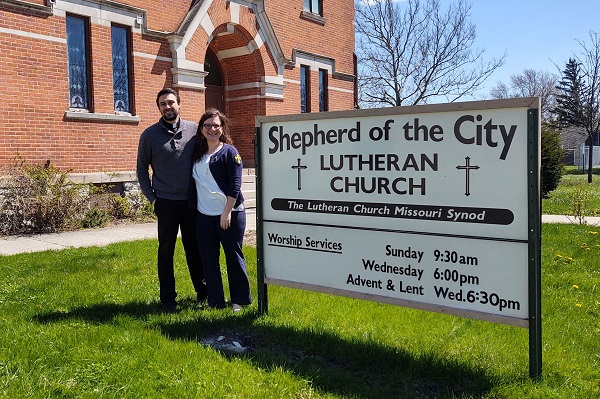
With Call Day coming up in two days and the anticipation of the new calls, vicarage assignments, deaconess interns, and deaconess placements, we decided to sit down with one of our current vicars, who will be finishing up his year of vicarage in June. Before beginning seminary training, Phil Jaseph served as a missionary in Africa where he met his wife Rachel, a Concordia University Chicago-trained deaconess also serving in missions.
They work together in a unique vicarage situation. Shepherd of the City is small, served by vacancy pastor Rev. Dr. Jeffrey Pulse (who also serves at CTSFW as a professor and Placement Director); it’s probably one of the closest situations we have to an urban church here in Fort Wayne. Rachel has served as deaconess at the church since they moved to the area, where she focuses much of her time on the church’s outreach and community center, The Shepherd’s Hand. Phil was a fieldworker at the church for two years before assignment there as vicar. It’s an uncommon setup, adapted to suit Shepherd’s unique needs.
Vicar Jaseph answered questions about what it is like to be a vicar in this current context. Deaconess Rachel later joined us as she was able, after she finished with a Zoom meeting for her work with the Shepherd’s Hand.
INTERVIEWER: What is it like to serve as a vicar through the COVID-19 pandemic?
VICAR JASEPH: So, it’s fair to say that no one in my class set out expecting this. It’s been a very strange year. I was remarking to my wife the other day that I can sort of distinguish between the quarters, the three month groupings. We’ve had interesting little crises or situations between all of them, except for winter, and then now in the last quarter of my vicarage (because I’m done in the middle of June), it just feels like such a sucker punch.
You’re all gamed up to continue doing what you’re doing: hey, I’m going to do this Bible Study, I was close to wrapping up teaching 6th grade at St. Paul’s, finishing up I think it was the Creed (I can’t even remember now), spend the last quarter with 8th grade on what it means to be a Christian in the world. I was looking forward to talking about suffering as in integral part of that. Kind of odd in light of all this.
We’re still very busy here—Shepherd of the City is a small congregation, but there’s still a lot to do. The time is still being consumed with tasks, but oftentimes now you’re doing the work so that you can do the work. We’re going to be trying to see about visiting a member who is in an assisted living facility. Whether that’s talking to her through her window or having some sort of an intercom/speakerphone thing setup, I’m not sure—but we intend to do that.
We’re also not the most technology advanced congregation. That’s not to say that we don’t know what we’re doing, but we’ve had to adapt very quickly to a recording situation. It’s been a good opportunity for Rachel and I to discuss, you know, what are we confessing when we do these things? Is this something that you want to do long term?
And every congregation and every pastor arguably has to ask those questions. Something that’s been on everybody’s lips lately: what does the recorded service mean for sacramental Christians? There’s any number of ways you could go with that and, thankfully, I’m seeing a number of thoughtful, gracious, reasoned responses and pieces discussing individual congregational responses. Then also we should consider them in the wider, maybe more ecumenical Body of Christ and within our specific Lutheran tradition and denomination. Interesting times to be sure.
INTERVIEWER: What else do you mean by “doing the work to do the work”?
VICAR: I think it’s fairly common that we fall into a routine in the parish. We have a structure, we have a schedule, you can pretty much jot out your life day-by-day, week-by-week, so that you’re making the best use of your time. I got advice from professors in my first two years at Seminary how to schedule my week, in terms of making the best use of your day off, in terms of sermon preparation.
That routine has been fairly turned around or just gotten rid of entirely. The first four days of the week now are wide open. That leaves me room to make more calls and, in a sense, a lot more visits than I was able to before. We get the system set up to do recordings on Saturday mornings so that services would be ready for folks on Sunday morning, as close to regular and normal for them as possible.
But it’s really strange, because even though the full extent of a normal Sunday morning often takes longer than what we do now on Saturday morning, Sunday morning in my mind is still easier. I’m there at 8:30, quarter to 9, I’m unlocking the doors, I’m turning on the lights, I’m checking the thermostats, I’m double checking the candles if I haven’t filled them already, I’m looking at the elements for communion, checking everything, and just making sure that it’s ready. And oftentimes we won’t be done with everything—that includes Divine Service, chatting after the service (so fellowship, coffee time, Bible study, Sunday school, talking with people as they’re leaving), turning off some of the thermostats and getting the lights—sometimes it would mean I wouldn’t be done until 1:30, all said and done, or on the late side 2. So that could be five and a half hours. Now largely what we do is done in two, two and half hours.
But it’s strange not having all the faces out there. There’s faces that I miss because of the way they respond to things in the liturgy and there are those people I miss because of the feedback they give when I’m preaching. There are certain folks I can depend upon to nod when they’re connecting, to make a face when they’re thinking, to bow their head as they’re reflecting or perhaps feeling convicted. These are the things that you miss. They add life to the space. They comprise the people of God sitting out there in the pews. It’s more than just, say, Andrea and Heidi and Sara and all of the people who show up. We are the family of God, gathered there in that place. We are more than ourselves. And that’s what we confess with physical gatherings for the Divine Service, and most especially that physical reception of the Sacrament.
It’s our intention to not do this forever. We want to get back to celebrating the Eucharist. We want people to be receiving Jesus’ Body and Blood. Do their Baptisms keep them at home? Absolutely. Does God’s Word do what He says it will do? Absolutely. They have the forgiveness of sins in confessing them. God is still working faith in them, strengthening the faith He has already given them even while they’re away.
And so we understand, too, there is still that unity in the Body of Christ despite the fact that we are physically separated and fragmented right now. We’re not really disconnected. We’re missing one another and we’re made to be physical beings in communion, in community, in relationship with one another, but we know that this is temporary. Either that this will end in the short term or even in the long term. One way or another, we will be physically reunited, whether it’s this side of heaven or the next.
INTERVIEWER: In light of these times, what are your thoughts on physical presence?
VICAR: As Lutheran Christians we always want to remember that our faith and the certainty of our faith, as Jesus shows us in the Gospel and as we are continuously reminded throughout all of God’s Word, God in His mercy gives us tangible things for us to taste, to see, to hear, to experience.
That’s not to say that all of a sudden we’re existentialists, just about good feels and whatever feelings or vibe you’re getting (we hear a lot of that language today), but God has given us the Sacraments for the strengthening of our faith, for assurance in difficult times. We can point to these things outside of ourselves. The culture and society would have us say: better yourself. Discern your own problems. Self-improve. Self-actualize. Develop the self to reach this higher goal or this higher state of being, whatever it is you’ve diagnosed. Whereas as Lutheran Christians we say it’s not about us at all. It’s not about us at all because of our great fall into sin.
But God in His mercy has made it about us. He has given of Himself to care for us, to reconcile us to Him because he knows that we forget. And because we are limited, finite creatures, He has given us the certainty of Jesus’ Body and Blood, in, with, and under the bread and wine; in the water of Baptism; in hearing the words of the pastor, “You are forgiven, in the stead and by the command.” He works through means.
And so we always want to remember that. We view these recorded services as a temporary thing, because it’s our goal to have the family of God gathered in one place. To not only preach and teach about the unity within the Body of Christ that Christ has called to Himself and knit together, but actually do that, have that, be that.
You hear a lot right now, people are saying, “The Church is so much more than a building.” Yes, it’s true. But why can’t it be both? This place, this building where we gather—it’s not irrelevant. Could we have a service anywhere? Yes, we could. There are a lot of storefront churches out there. And my wife and I, as former missionaries, we’ve received the Sacrament in mud buildings, in concrete buildings, in storefronts, I mean all over the place.
I myself have gone months without receiving the Sacrament—not by choice—but because there are many Lutheran Christians in the world who are not afforded that privilege. And it is a privilege. And are they still Christians? Absolutely they are. But we understand that God cares for us in many ways. They are not mutually exclusive, rather they are all together, and the important thing we can understand in the middle of all of this is, just because our apple cart has been overturned or upset, God is not neglecting us. We understand, especially in light of Good Friday and the Passion narrative, the important thing about the incarnation was not that Jesus was made incarnate (as the Eastern Orthodox say), He was made man to die for us. That was the purpose of it. That’s the heart of it. Jesus knows about suffering. Jesus knows about loneliness and sadness and He took all of that for us.
We want to get back to that physical understanding of who the Body of Christ is, even now while we’re calling one another and praying for one another and missing one another. And this is truly a great burden for some of our members now. Not only here but in other places I’ve seen on the internet. Some people are really hurting, missing being able to spend that time in person, being able to hug, those sorts of physical touch. It’s important, it’s not irrelevant.
So to wrap all of that up: we hope to get back to doing the Divine Service in person, we want to ask people how they’re doing, we want to hear their voices as they sing hymns and as they pray, as they lift songs of praise to God. As they say, “Amen!” to all of the promises of God that they receive in this place in person.
Communion is for people to receive it. We as a congregation have made the decision that we’re not going to do it right now. I haven’t had it in a few weeks. And that’s an individual decision that every parish and every pastor needs to make and we shouldn’t look askance at somebody who isn’t doing as we do. That’s a whole other conversation for another time.
But it is about the people. And the place where the people receive God’s gifts is not irrelevant. He’s given it to them in this time, in this place, and we understand that God does not disregard time and place, but rather that he broke into time and space in the incarnation, and that He was always interacting with His people in time and in space as He knew that they were there. This is a place and building that He has given us out of His mercy.
How long will we have it? I don’t know. But it’s where we are right now, and so it does matter. The building does matter, as well as the people who are the body of Christ. We want to make sure we remember that God comes to us through concrete means.
INTERVIEWER: How has the Seminary prepared you for vicarage, or even specifically for this strange time that nobody knew was coming?
VICAR: Number one, no one could prepare anybody for this situation. But that being said, the Seminary has given me all the tools needed, all of the building blocks, all of the resources, all of the comfort and familiarity that I gained from doing fieldwork, from doing visitation, from preaching, from doing Bible Study.
I’m still employing that, I’m just employing it in a different way. Every situation is different. They may have similarities, but every situation is different. So it’s simply adapting and trusting that God has given me everything I need to live this day, to take it one day at a time, because He’s given it to me—this day and not any other. I will rejoice in it, as we hear in the Psalms. “This is the day that the Lord has made.” I sort of think of it as: this one! Not another one, not what you would’ve liked, but THIS particular one.
And so in doing that He’s blessed it and sanctified it for you to live in it and to care for His people in it. So I get up and I just say, “I don’t know what’s going to happen today, but I’m ready for it.” It’s led to some surprising interactions and phone calls, but those have been wonderful. Those have been blessings.
At the Seminary I was given a toolbox of skills, of things to keep in mind, of resources to use, and ways to think about things. In my first two years, that toolbox was filled up with every class, with every professor, with many colleagues and fellow students there; they were adding things to my toolbox and I was adding things to theirs. We were learning together. So we were prepared for this time.
None of us expected it, none of us perhaps felt we were prepared—we’ve all had to adjust our comfort levels a little bit—but because we understand the Church is God’s and the people who are in it, and He’s given us this day, this time, this place, this circumstance, we understand that it’s not outside of His control. We’re simply doing our best to find the best ways to make use of the time, for the days are evil.
Or the days may feel evil right now, but we understand that the days are fleeting and there are still people who need to hear the Gospel, both inside of the Church and outside of the Church.
INTERVIEWER: Is there anything else you’d like to say?
VICAR: If it wasn’t clear before, I do want to thank the Seminary, cause as I’ve said: no one could have known, no one could have been prepared, but I feel very well equipped and I feel very well supported here. And I feel the support of the Seminary’s administration, staff, and faculty. I’ve reached out to the Registrar about classes that I’m looking now to register for my last year. Dr. Zieroth [Dean of Students] has been checking in on us, has made himself very available, and said, if there’s anything that you need, if stuff gets really weird, please relate it back to me and of course I keep you all in prayers.
I don’t think anything could’ve been done any better. And so we remember that even though no one could have predicted or expected this situation, and even though the Body of Christ is comprised of sinners, that goes for the Seminary too. We all have faults and failings and weaknesses, but God has used all of those folks on the faculty who have taught me, who have mentored me, who have encouraged me, to prepare me for this time. They have equipped me to continue growing, to be a robust person who, God willing, will receive a call as a pastor. They have done their best to prepare me for the situation, not knowing everything that everyone will face.
So I’m grateful that I feel ready. I’m grateful that the world doesn’t feel like it’s falling down around me, even though we’re wondering what’s going to happen next. And I owe that to the Seminary.
[Deaconess Rachel had since had the chance to join us.]
INTERVIEWER: So what about for you? What has it been like serving during this time?
DEACONESS RACHEL: Like everybody, we’re just trying to adjust, to figure out how to serve the needs of our members and the community that we’re trying to reach in a way that is meaningful to the actual needs that they have – physical needs, spiritual needs, all of those – but also being realistic about our capacity to do that. I have all sorts of ideas for the future even aside from COVID-19, all sorts of ideas for things we might do here at Shepherd’s Hand and Shepherd of the City in the future, but this time has highlighted the importance of being realistic with what we can and can’t do, so that we can zero in on doing a few things really well.
In my mind that has to do with some of the follow up and the spiritual care; doing our best to be a phone but also adjusting to still meeting needs by doing a diaper drive [following the cancellation of the Health Fair], still trying to put resources in people’s hands. Not a ton has changed work-wise because I can still work where I want, but in terms of this year, it’s been unique getting to work with my husband on his vicarage. It’s been great.
INTERVIEWER: You’ve worked with a number of vicars since you’ve been here. What is it like serving alongside a vicar who is also your husband?
DEACONESS: The situation at Shepherd is unique in a number of senses. In a lot of places, the vicar and the deaconess wouldn’t necessarily be the-during-the-week fulltime people, exclusively. But it’s good. Especially now, we can talk about things whenever we want. There’s not a defined time where I can or can’t bounce ideas off my coworker. It’s been good for our marriage, we’ve learned a lot about each other. We’re pulling in the same direction.
I think I overheard a little bit of Phil talking about how he understands, even more deeply, some of the joys and the struggles in the ministry side of things, to a new depth perhaps.
VICAR: We’re good complements for one another. We enjoyed working together before but haven’t been able to experience it to such a full extent as we have now.
DEACONESS: Our jobs certainly overlap, and Phil supports a lot of things happening at Shepherd’s hand. I’m called to the church, but I’m largely here at Shepherd’s Hand; there’s a lot of crossover. In large part, the crossover is sharing of ideas and stuff.
VICAR: It’s an ongoing dialogue. We never really stop it, we just set it down and pick it back up.
DEACONESS: It’s good practice learning how to communicate; even, sometimes I need to not talk about that right now and saying that when I need a break, or he needs a break.
VICAR: It’s been good for us to remember too that we’re public people, as President Rast is always saying. Anytime you put something on the internet, or anytime you put something down in writing, it’s not yours anymore, it’s whoever sees it, or whoever gets it. But that’s been important for our marriage, too, because I always do my best to speak well of her in person, and to support her when she’s not there, or to refer people who need her back to her and she does the same for me.
Rachel has already been a deaconess for awhile. Being able to actually live with, be married to a deaconess and actually see her work, shows me the many blessings that can come from the not-always-common marriage of pastor and deaconess. She will be an invaluable resource. She IS a great resource. She catches the people that I don’t catch. We both have people who are more comfortable, who more readily speak to one or the other, so we sort of fill each other in on that. Or she’s able to catch the people who are sneaking out, who are dodging the receiving line.
DEACONESS: (laughs) I do my best to do that.
VICAR: It’s been an encouragement to me, too, to also think about what I’m learning in pastoral theology and theological education and to run it through her filter to and see what some of her considerations are. So you get another perspective. I mean, always affirming, but thinking about it from a different angle.
DEACONESS: How a sermon sounds to a listener sometimes sounds different to how it sounds in your head. So sometimes I give him feedback; I’d do this even if I wasn’t a deaconess. Give him feedback, like, what does that word mean?
VICAR: (laughs) “No one’s going to know that word, honey,” like when a congregation member stopped me after a sermon where I called Nicodemus’s supporters a “hoard of toadies.” The member says, “WHAT did you say?”
DEACONESS: I should’ve caught that one for you, hon.
INTERVIEWER: Well, like you said, love covers a multitude of sins.
[Plenty of laughter followed, as did a discussion on communion practices during the pandemic—which is the sort of debate that happens when you put two church workers and a theologically-interested layperson in a room together—then the quickly-seconded suggestion that we hold a potluck on the first Sunday everyone is able to return once the restrictions lift. Finally, we ended on a quick debate on the best place to take a picture at Shepherd of the City. Thank you to both Vicar Phil Jaseph and Deaconess Rachel Jaseph for your time and for your gracious answers to all questions.]
With Call Day coming up in a week, here’s a highlight from one of our deaconess interns, who is looking forward to having her placement announced at the service coming up on Wednesday evening, April 29. Mika Patron wrote the following for her church, explaining what a deaconess does, especially in light of the source of all mercy work:
“What does a deaconess do?”
That’s always a hard question for me to answer—not because I don’t have an answer, but because there are so many ways to answer that question. I could list off the different ways I serve at Grace; I could focus on one specific aspect of what I do, like support Pastor, visit our shut-in and hospitalized members, or work with high school teens; I could talk about what deaconesses are doing all over the world, like Deaconess Christel Neuendorf’s care for earthquake victims in Puerto Rico; I could talk about what deaconesses have historically done, from the early church to the time of C.F.W Walther and Wilhelm Loehe, how they cared for the sick, the lowly, and the poor, whether young or old, male or female, who were passed over by society as unworthy of care.
But all of those answers that I could give have to also be connected to their source: Jesus! As the children of God, all of us love and care for those forgotten or ignored by society, the poor and the sick, and everyone in between, because our Lord Jesus first loved and cared for us! He came not to be served, but to serve and give His life as a ransom for many (Matthew 20:28).
Our Lord Jesus’ service is the source of all deaconess service: His love and mercy drive us to love the high school teen, hold the hand of a dying 92-year-old saint, sort clothes for those who need them, and point God’s people to their pastor to receive Christ’s Gifts of His Word and Sacrament for the forgiveness of sins and to strengthen faith. Deaconesses care for people’s bodily and spiritual needs because that’s what our Lord did-and continues to do! We do all of this because the poor among us, our sick, our elderly brothers and sisters in Christ, our struggling high school students, our family members, our friends and neighbors are precious treasures in Jesus’ eyes. And so are you. You are Christ’s treasured possession! Jesus sold everything He had to make you His own (Matthew 13:44-45)! Because you are precious to our Lord, you are precious to the deaconess-you are precious to me: And therein lies the joy of deaconess service, the joy of serving this family of God at Grace in Auburn, Michigan: “What does a deaconess do? What do you, Mika, do as a deaconess?” My answer: I get to love and care for Christ’s treasures!
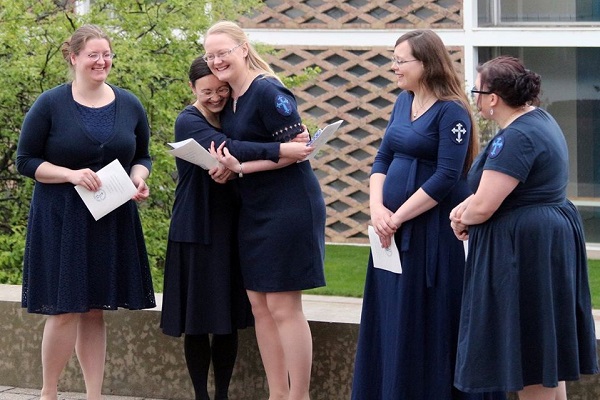
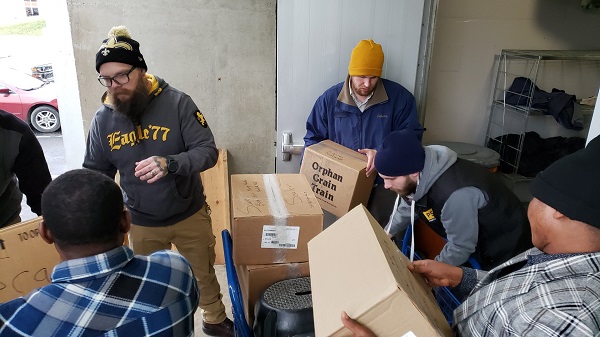
Last night, over 30 students, families, and staff members gathered for Mercy Meal Packing for Orphan Grain Train, packing 57 boxes in just over an hour. Each box contains 36 bags, each bag comprised of six meals. Plenty of fellowship and fun was had as the community carried out Christ’s love in this mission. Packing will continue today as we work to fill more boxes.
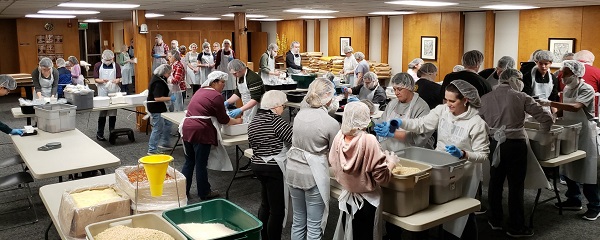
Deaconess Katherine Rittner, Director of the Food & Clothing Co-op (the Food Co-op received donations from orphan Grain Train as well), organized the times for packing as well as got word out to the CTSFW community. These particular meals will go to Haiti. She also explained one of the examples of how these meals are used for evangelism, as in the case of a pastor and missionary in the Philippines who uses these meals to bring children into the Lutheran school for education. “What an incredible way for our CTSFW students to not only live out the mission statement of CTSFW to teach the faithful, but how these are used to reach the lost and especially care for all in all of the world!!!! How wonderful and merciful is our God!!!!”
Also of note is the math: the number of meals per box comes out to 216. Deaconess Rittner then pointed out the number’s connection to James 2:16: “and one of you says to them, ‘Go in peace, be warmed and filled,’ without giving them the things needed for the body, what good is that?”
Thanks be to God, that He gives us the opportunity to share both Word and bread!
